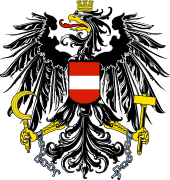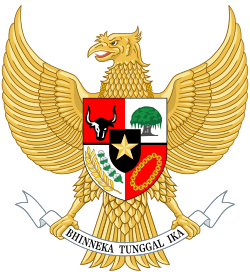Austria–Indonesia relations
Austria–Indonesia relations refers to the bilateral relations of Austria and Indonesia. Austria recognizes Indonesia as a stable and reliable partner, and both countries enjoy excellent relations.[1] The two nations have agreed to expand relations in business, trade and investment, tourism, culture, environment and green technology.[2] Austria has an embassy in Jakarta and honorary consulates in Yogyakarta, Bandung and Surabaya, while Indonesia has an embassy in Vienna that is also accredited to Slovenia as well as the Vienna-based multilateral organizations, such as IAEA, PrepCom CTBTO, UNIDO, UNODC and UNOOSA.
 | |
Austria |
Indonesia |
|---|---|
History
The bilateral relations between Austria and Indonesia were officially established in 1954, one year before regaining Austrian own complete sovereignty from the Allied Powers and nine years after the Indonesian proclamation of Independence[1] In 2010, Austrian President Heinz Fischer visited Indonesia and paid a courtesy call to then Indonesian President Susilo Bambang Yudhoyono.[2]
Trade and investment
The bilateral trade volume between two nations in 2015 reached 445 million euros, with the balance of trade being more or less in equilibrium. Austria main exports to Indonesia are steel, machinery, electronic equipment, paper and pharmaceuticals, while importing footwear, textiles, spices, coffee and electronic goods from Indonesia. By 2017, there are around 40 Austrian corporations that run their operations in Indonesia.
Technology, education and culture
Indonesia is keen to learn from Austrian expertise in renewable and sustainable technology, such as hydroelectric power, biomass energy, and solar energy. Austrian also has promoted the benefit of green technology, by showcasing its new "green embassy" in Menteng area Central Jakarta. Inaugurated in November 2011, Austrian Green Embassy in Jakarta demonstrate sustainable architecture in a tropical climate, saving energy and water by installing solar panels, rainwater storage system, shaded windows and thermal insulation.[2]
On education sector, the government of both countries has agreed on post-graduate student exchanges, signed between Indonesia's Ministry of Education and Austria's Agency for International Cooperation on Science and Research. Annually, Austria offers about 30 scholarships to Indonesian students, and every year there are around 40 Austrian students visit Indonesia to perform their study. Several Austrian universities also have established cooperation with their Indonesian counterparts, such as Gadjah Mada University and the Bandung Technological Institute.[1]
Notes
- Veeramalla Anjaiah (October 26, 2009). "Austria, RI celebrate 55 years of relations with cultural shows". thejakartapost.com. The Jakarta Post. Retrieved 18 June 2013.
- Yanto Soegiarto (January 3, 2012). "Austria's green power". thejakartaglobe.com. Jakarta Globe. Retrieved 18 June 2013.

